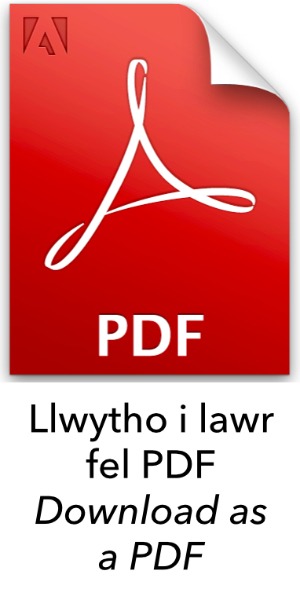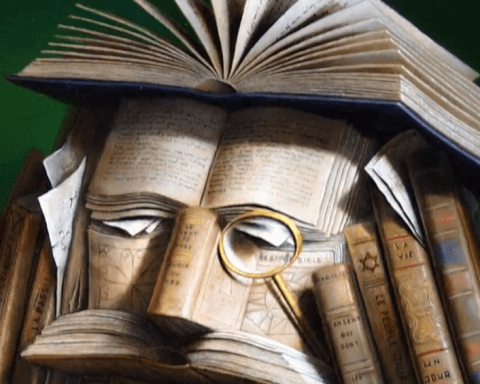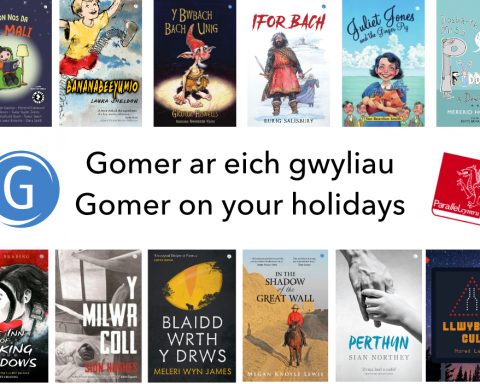Dechreuais i sgrifennu’r darn hwn pan o’n i’n neud y Cwrs Canolradd. Bryd hynny, ro’n ni’n cael ein hanogi i ddarllen llyfrau Cymraeg i ddysgwyr. Ro’n i wrth fy modd pan sylweddolais i y gallwn ddeall fersiwn o ran o’r “Mabinogi” – Pedair Cainc y Mabinogi i Ddysgwyr gan Alun Ifans. Rwy eisoes wedi darllen sawl fersiwn yn Saesneg (yn ddiweddaraf, The Mabinogion (Oxford World’s Classics) gan Sioned Davies), ond gwych oedd darllen y chwedlau yn yr iaith wreiddiol (wel, mwy neu lai, ta be!). Cedwch olwg am yr enwau Math, Goewin, Lleu, Arianrhod, Blodeuwedd, Gronw, ac Arawn. Mae Ceridwen (o “Hanes Taliesin”) yn ymddangos hefyd. Gobeithio bod chi’n gwerthfawrogi tipyn bach o gellwair du! Es i yn ôl i’r stori hon wrth neud y Cwrs Meistroli, pan o’n ni’n dysgu llawer o ddiarhebion, felly cynhwysir un neu ddau ohonynt yma. Un peth arall: mewn diarhebion dych chi’n clywed yn aml ffurfiau ffurfiol fel “erys” (“he/she stays,” o “aros,” “(to) stay”), hynny yw, trydydd person unigol y ferf yn yr amser presennol. Rwy wedi defnyddio rhai o’r ffurfiau hyn yma er mwyn ymarfer. Gobeithio bod popeth yn iawn: rwy wedi edrych yn Y Llyfr Berfau gan Geraint Lewis lle bynnag y bo’n bosibl! A chyda llaw: diolch yn fawr i’r darllenwyr astud sy’n rhoi adborth, fel y gallaf gyweirio pethau yn yr erthyglau, bod yn gliriach, a gwella! Dymunaf gasglu’r sylwadau hyn er mwyn adeiladu adnodd (“Camgymeriadau Cyffredin,” falle?) i ddysgwyr eraill ar y wefan hon maes o law.
I started to write this piece when I was doing the Canolradd Course. At that time, we were being encouraged to read Welsh-language books for learners. I was delighted when I realised I could understand a version of the “Mabinogi” – The Four Branches of the Mabinogi for Learners by Alun Ifans. I’d already read several versions in English (most recently, The Mabinogion (Oxford World’s Classics) by Sioned Davies), but it was excellent to be able to read the tales in the original language (well, more or less, anyway!). Keep a lookout for the names Math, Goewin, Lleu, Arhianrod, Blodeuwedd, Gronw, and Arawn. Ceridwen (from “The Tale of Taliesin”) makes an appearance too. I hope you appreciate a touch of black humour! I went back to this story while doing the Meistroli Course, when we were learning lots of proverbs, so one or two of them are included here. One other thing: in proverbs you often hear formal forms like “erys” (“he/she stays,” from “aros,” “(to) stay”), that is, the third person singular of the verb in the present tense. I’ve included some of these forms here in order to practise! I hope everything’s OK: I’ve checked in The Book of Verbs by Geraint Lewis where possible! And by the way: thanks very much to the diligent readers who are giving feedback so that I can correct things in the articles, be clearer, and improve. I want to collect these comments in order to build a resource (“Common Mistakes,” maybe?) for other learners on this website in due course.
| “Nid yn y bore mae canmol diwrnod teg” – Yn nyfnderoedd gorchuddiedig tiriogaeth Lleu, y tywysog ar goll – gweinion, gerwin, gwyntog – yr ymgasgla lampau. Dyma ddinas ddiffaith. Mewn heolydd fu fudd gynt – lle y gwenir gwyll gan sêr syrthiedig – yn awr heidia gweision cyflogedig. Gwerin gaeth. Plantos, gwragedd, gwŷr – wedi’u trwytho â gorchwyl gormesol – sy’n rhuthro’n wresog fel ei gilydd. Fe gychwynna gwaith. Try’r dref derfysglyd – frysur, frawychus, faleisus – yn brifddinas fywiog. Ymdroella’r daith… | “The morning is not the time to praise a fine day” – In the veiled depths of Lleu, the lost prince’s, realm – wan, windy, wild – there spangle lamps. Here’s a desolate city. In streets once mute – where twilight’s cheered by falling stars – now flock hired hands. Captive folk. Kiddies, ladies, gents – with oppressive labour loaded – rush, alike, enflamed. Work begins. Turbulent town – bustling, baleful, brutish – turns to capering capital. The journey unfurls… |
| “Digon yw ychydig yn fwy nag sydd gennyt” – Pelydrau cynta’r heulwen wan ymosoda ar y llenni gan gyfarch y cyfeillion mynwesol sy wedi bod yn troi a throsi yn y gwely blêr ar hyd y nos. Ac yno cais Math, giaffar y ffowndri (sy’n gallu tynnu ar linynnau’r galon fel dewin) gwtsio lan at y gariad felynwallt sy’n rhannu’i fywyd er pan ffodd rhag ei chyn-dwnimbe dieflig a’i gnud. Drewa anadl Math ar ôl iddo fwyta cyri’r noson gynt, a thwll ei din hefyd. Ac mae wastad yn rhochian fel mochyn a chrensian ei ddannedd, er iddo yntau’i galw hithau’n ast front, gleplyd drwy’r amser. Ddim arni hi mae’r bai. Mae e fel rhech mewn potel o ran mynd am dro hir ar y traeth a phrynu bwyd a digon o gnoi ynddo. “Ddim bywyd i forwyn neis yw hwn,” meddylia Goewin y ci arffed, “heddiw fe fydda i bant!” | “Enough is a little more than you already have” – The weak sun’s first rays attack the curtains, greeting the bosom buddies who’ve been tossing and turning in the messy bed all night long. And there Math, gaffer of the foundry (who can play the heart-strings like a wizard) tries to cwtsh up to his blond beloved, who’s shared his life since she fled from her devilish ex-I-don’t-know-what and his pack. Math’s breath stinks after he ate a curry the night before, and his bum does, too. And he always snores like a pig and grinds his teeth, although he calls her a dirty yapping bitch all the time. It’s not her fault. He’s like a fart in a bottle when it comes to going for a long walk on the beach and buying chewy enough food. “This is no life for a nice girl,” thinks Goewin, the lap-dog, “today, I’m off!” |
| “Gwsg galar ond ni chwsg gofid” – Yn ei chrud euraid, mae’r eneth fach brydferth yn rhwygo ei chewyn wrth biso fel ffynnon. Wedi dod i ben ei thennyn mae’i Mamaeth, Blodeuwedd, yn enwedig gan fod ei gŵr yn mynd bant am sesiwn fawr ers i’w ferch gyrraedd, fel petai dan gyfaredd. A dyna oedd yr un pryd y symudodd y lletywr secsi newydd i mewn. Teithia ef o gwmpas y wlad gan werthu pleidleisiau i wleidyddion anunion, sef i'r rhan fwya ohonyn nhw, pan fydd yn gweithio, hynny yw. A dyw’r greadures fach fach swynol ddim yn gallu agor ei llygaid eto, na defnyddio’i chlustiau. Ond eto i gyd, mae hi’n gwledda ar fronnau’i mam yn fwy rheibus na chenau blaidd, Duw a’i bendithio. Rhaid ei bod yn poeni ynghylch ei Thadmaeth crwydrol. Heb eiriau, mae’r rheibes leiaf hon yn tybio ble mae’i brodyr a chwiorydd eraill wedi mynd. Wrth i’r haul hyf dynnu’i dafodau o fflam ar y Fami Flasus, “bow-wow, grrrr, wff-wff” dywed bechan y nyth, o’r enw Ceridwen, dan ielpan yn gwynfanus. | “Grief sleeps but anxiety does not” – In her golden crib, the beautiful little girl’s busting her nappy while peeing everywhere. Her Foster-mum, Blodeuwedd, is at the end of her tether, especially as her husband’s been off on a bender since the girl arrived, as if under a spell. And that was the same time that the new sexy lodger moved in. He travels about the land selling votes to crooked politicians, namely, to most of them, when he’s working, that is. And the enchanting little creature can’t open her eyes yet, nor use her ears. But then again, she feasts on her mum’s breasts more ravenously than a wolf pup. God bless ‘er. She must be worrying about her wandering Foster-father. Without words, this tiniest witch wonders where her other brothers and sisters have gone. While the cheeky sun pokes its tongues of fire out at the Yummy Mummy, “bow-wow, grrr, woof-woof” says the runt of the litter, Ceridwen, yelping plaintively. |
| “Nesaf i’r eglwys, pellaf o baradwys” – Mae’r llwyni tu fas i Deml y Gogoniant Cuddiedig yn gysurus ond cyfyng mewn gwirionedd. “Trueni mawr bod nhw’n mynd i godi ffens i gadw’r crwydriaid allan,” ochneidia Lleu. Ac maen nhw’n gartref iddo ers tair wythnos erbyn hyn. Dyna pan ehedodd gwraig y pencampwr dartiau bant gyda’r trafaeliwr. Wel, pan symudodd yr hen drawsfeddiannwr i mewn, dylem ddweud. Ar y stryd, arhosa adargi melyn sorllyd er mwyn gwneud ei busnes dan rechu’n uchel. Ymleda’r hylif mewn pwll gwlyb, twym tua phen Lleu wrth iddo lyncu dyrniad arall o dabledi a gweddill y botel o wisgi. “O na bawn i'n eryr,” mwmia fe, tra llithra ei ymwybyddiaeth ymaith. Yn fuan, bydd yr haul yn gwenu ar ei gelain oer. | “Nearest to the church, furthest from paradise” – The bushes outside the Temple of the Hidden Glory are comforting but hemmed-in, in truth. “It’s a big pity they’re going to put up a fence to keep the tramps out,” sighs Lleu. And they’ve been his home for three weeks now. That’s when the wife of the darts champion ran off with the travelling salesman. Well, when the old usurper moved in, we should say. On the street, a sulky golden retriever stops to do her business while farting loudly. The liquid spreads out in a warm wet pool towards Lleu’s head while he gobbles another fistful of pills and the rest of the bottle of whiskey. “O if only I were an eagle,” he mumbles as his consciousness slips away. Soon, the sun will smile on his cold corpse. |
| “Addo teg a wna ynfyd yn llawen” – Mae Arianrhod yn chwerthin wrth yrru’i fan (a rhodau prydferth o liw arian iddi hefyd) i’r ysbyty lle gweithia drwy’r dydd yn y marwdy. O, cymaint y mae’n ymhyfrydu’n trin talpiau o gnawd oer! Petai hi ond yn cael hyd i sboner oedd yn byw. Fyddai hynny yn ormod i’w ofyn? Yn ei hamser sbâr mae’n potsian gyda gwella'r cartref, ac mae hi wedi bod wrthi’n helpu ei ffrind i adeiladu ‘stafell newydd a diogel iawn yn ei seler, “rhag ofn argyfyngau.” Gŵr hysbys ydy, sy wedi addo y caiff hi beth bynnag a ddymuna, os dilyn athrawiaeth y dewiniaid fwdw a wna. Felly rhuthra hi i’r gwaith i ddod o hyd i fawd dyn sy wedi lladd ei hun ar dir cysegredig am doriad dydd. Ac yna, er ei mawr lawenydd, mae hi bron â bwrw i lawr ryw hurtyn sy’n crwydro yn yr heol, wrth i’r haul ddawnsio ar yr orwel, o dan y darangwmwl sy’n crynhoi. | “Fair promises will make a fool happy” – Arianrhod laughs while driving her van (which has beautiful silver-coloured wheels too) to the hospital where she works all day in the mortuary. O, how much she delights in dealing with lumps of cold flesh! If only she could find a boyfriend who was alive. Would that be too much to ask? In her spare time, she dabbles in DIY, and she’s been working hard helping her friend to build a new, and very safe, room in his cellar, “in case of emergencies.” He’s a clever man, who’s promised that she’ll have whatever she desires, if she follows the teaching of the voodoo priests. So, she rushes into work to find the thumb of a man who’s killed himself on consecrated land at daybreak. And then, to her great joy, she almost knocks down some fool who’s wandering in the road, while the sun dances on the horizon under the gathering thundercloud. |
| “Na sang ar droed ci chwerw” – Mae’r trafaeliwr, Gronw, yn sioncach ei gam wrth iddo ymlwybro ar ei rownd. Mor lwcus ydy, mae ‘da fe wejen newydd, hyfryd, ac mae’i broblemau gyda’i lety wedi diflannu. Brasgama e heibio i’r clawdd lle mae rhyw ddyn llawn cynrhon yn gorwedd, gan fwrw melltith ar yr adargi melyn gwaedlyd sy’n sefyll yn stond yn ei ffordd dan chwyrnu arno’n fileinig. Ac edrychwch! Dyna lances mewn fan wen sy’n prysur ddal y slac yn dynn. Yn ei fyd bach, rhagrithiol ei hun mae Gronw, sydd ar fin rhoi cic i’r ci. A chwap! Fe’i hysgubwyd oddi ar ei draed gan y ferch sy’n gyrru heb y gofal a’r sylw dyladwy. Mae hi fel ci yn y preseb neu gath mewn cwd, ac felly anwybydda hi’i gorff rhwygedig. “On’d yw bywyd yn rhad?” chwardd yr haul newydd-anedig dros bob man. | “Tread not on an angry dog’s foot” – The travelling salesman, Gronw, has a spring in his step as he goes on his rounds. He’s so lucky, he’s got a lovely new girlfriend, and his problems with lodgings have disappeared. He strides by the hedge where some maggot-ridden man is lying, cursing the bloody golden retriever which is standing stock-still in his path, snarling savagely. And look! There’s a girl in a white van, who’s busy doing nothing. Gronw’s in his own little hypocritical world, and about to kick the dog. And wallop! He’s swept off his feet by the girl who’s driving without due care and attention. She’s like a dog in a manger, or a pig in a poke, and so she ignores the shattered corpse. “Isn’t life cheap?” laughs the newly-born sun all about the place. |
| “Dianc rhag y mwg a syrthio i’r tân” – Ymddengys Arawn oddi mewn i’w dwll uffernol gyferbyn â’r llecyn lle digwyddodd y ddamwain gan ebychu “’Tawn i heb ffoi!” Bron yn ddall ydy, ac ofnadwy o unig, ond mae’n gwarchod ei deyrnas â dycnwch tarw unllygeidiog, a nawr mae’n bwriadu rhoi cymorth i’r gwerthwr archolledig os bydd yn ei ladd e. Llama calon y pedler, rywsut, pan y’i llusga’r corrach crebachlyd i seler yr hofel simsan. Mae wedi’i drywanu â pholyn, ac wedi’i ddrysu’n llwyr. Ar ôl iddo yfed peiriaid o lasfedd, a llwyth lorri o fadarch hudol ynddo, dim ond llygad smiciog yr heulwen a wél a fydd e’n fodlon, os nad yn orawenus, yn ei gartref newydd (neu’n hytrach ei garchar), am weddill ei oes. | “Escape from the smoke and fall into the fire” – Arawn appears from inside his hell-hole opposite the spot where the accident happened, exclaiming: “Well, blow me!” He’s almost blind, and terribly lonely, but he guards his territory with the perseverance of a one-eyed bull, and now he intends to give succour to the wounded salesman if it kills him. The peddler’s heart thuds, somehow, when the crinkled dwarf drags him to the cellar of the rickety hovel. He’s been impaled on a pole, and is completely discombobulated. After he drinks a cauldronful of spiced mead with a lorry-load of magic mushrooms in it, only the sunshine’s winking eye will see whether he’s satisfied, if not ecstatic, in his new home (or rather his prison), for the rest of his life. |
| “Gŵr dieithr yw yfory” – Felly dyma’r haul yn sefyll yn ei unfan. Yng nghorffdy’r ysbyty, mynd o’i chof mae’r gynorthwywraig, pan sylweddola fod ci wedi cnoi dwy fawd y corff ymaith. Mae’n boddi mewn dagrau a gin, wrth iddi ddatgan y geiriau tyngedfennol ar hap, gan ddadwneud y swyn fwdw: “Rhwng gwyll a gwawl…” Ond wedyn, wele’r wraig, mor drofaus â thylluan, sy’n galaru wrth i’w gŵr clwyfedig (a ddylai fod wedi marw yn ôl ei chynllun mawr) ddihuno o’i lesmair angheuol, tra dechreua’u baban regi fel tincer yn Gymraeg Beiblaidd – diolch byth! | “Tomorrow is a stranger” – So here’s the sun standing still. In the hospital mortuary, the assistant’s going out of her mind when she realises that a dog has chewed the two thumbs off the body. She’s drowning in tears and gin as she intones the fateful words at random, undoing the voodoo magic: “From dusk to dawn…” But then, behold the wife, as dissembling as an owl, who moans as her injured husband (who should have died, according to her big plan) wakes up from his deathly stupor, while their baby begins to swear like a tinker in Biblical Welsh – thank goodness! |
| “Ci yn udo noson ole; newydd drwg ddaw yn y bore” – “Fy hawl heb dawl…” A dyna hen gythraul wedi’i feddwi ar ei lwyddiant yn baglu i lawr y staer i’r ddaeargell cyn farwed â'r ci ym mol y clawdd, diolch i ryw gi trwstan oedd yn crwydro o gwmpas gan chwilio am rywbeth i’w fwyta. “Rhyngof fi a’m cawl…” Fan yma, mae trafaeliwr yn ymysgwyd o’i drwmgwsg ym mreichiau’r gorffdy-wraig lewygol, hurt. Mae wedi’i achub gan gi a ffroen iawn ganddo am fadarch. Yn anffodus mae’n marw o’i friwiau ac fe gaiff drigo yn Annwfn am byth, rhyw ffordd neu’i gilydd. “Ewch bawb i’r diawl…” | “A baying dog on a moonlit night; mournful news in the morning bright” – “Let yearning spawn…” And there’s an old devil, drunk on his success, stumbling down the stairs to his dungeon as dead as a doornail, thanks to a certain clumsy dog that was wandering about looking for something to eat. “But I'll not mourn…” And here, a travelling salesman is shaking himself from his deep slumber in the arms of the silly, swooning, mortuary-girl. He’s been saved by a dog with a nose for mushrooms. Unfortunately, he’s dying of his wounds and he’ll get to dwell in the Underworld forever, one way or the other. “While Hell’s jaws yawn…” |
| "Gwell cariad yr ast na’i chas” – Draw fanna, fforman edifeiriol sy’n prancio gyda’i hoff ufferngi, arwr anhysbys y dydd, ar draeth wedi’i daenu ag esgyrn suddlon. Wel, “Ofer cadw ci a chyfarch eich hunan,” efallai. Gorfoledd ni ddaw ei hunan, a gwawria’r gwir ar bawb, fesul un. Hwyrach y bu’r holl drueiniaid yn gymeriadau mewn breuddwyd arallfydol, di-ben-draw — | “Better the bitch’s love than her hatred” – Over there, there’s a repentant foreman, gambolling with his favourite hellhound, the unsung hero of the day, on a beach strewn with juicy bones. Well, “It’s futile to keep a dog and then bark yourself,” perhaps. Rejoicing comes not alone and the truth dawns on everybody, one by one. Maybe all the poor creatures have been characters in an endless, otherworldly dream — |
| “Cyd bo hirddydd, daw ucher” – Dirwyna hyn oll i ben, er hynny, hefyd. Disgyn diobaith. Fe daga hanes – fe grŷn goleuadau wrth iddynt ddiffodd – fe deifl tawelwch uchel fantell dros bob dim. A dyna ddiwedd ar deyrnas ddychmygol yr haul. Marw y mae iaith. Dim ond dewin a gwynt a erys gyda’r gwyll. Fe alaetha hiraeth. | “Though the day be long, evening will come” – All this too, though, ceases. Despair descends. History suffocates – lights tremble as they wink out – loud silence throws a cloak over all. And that’s the end of the sun’s imaginary realm. Language dies. Only wizard and wind wait with the dusk. Longing laments. |
Mwy am Patrick / More about Patrick







